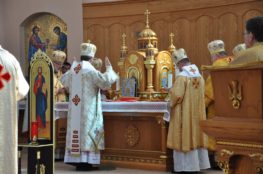St. Nicholas Charnetsky, a Ukrainian Greek-Catholic bishop and martyr for the Faith, labored with Christian charity and Apostolic zeal for the reunion of Orthodox with the See of Rome from the 1920s until his imprisonment by Soviet authorities in April 1945. As a member of the Congregation of the Most Holy Redeemer (Redemptorists), Charnetsky embodied both the monastic and missionary spirit of the order’s founder, St. Alphonsus Ligouri, by ministering to the most abandoned souls while never neglecting his rigorous daily prayer rule. As a Latin order, the Redemptorists may have seemed like a strange vehicle to bring the Word of God to Byzantine Rite Catholics and Orthodox, but as recounted in Blessed Bishop Nicholas Charnetsky, C.Ss.R. and Companions: Modern Martyrs of the Ukrainian Catholic Church (Ligouri Publications 2002), the saintly bishop
observed that the spirit of the Congregation of the Most Holy Redeemer—because of its simplicity, love of sacrifice and self-denial, and also because of its singular devotion to the suffering and eucharistic Jesus and to the Most Holy Virgin Mother of God—was very close to the spirit of the Ukrainian people, and created, as it were a link of mystical affinity.
It is unfortunately commonplace in certain Eastern Catholic and Orthodox circles to deride “Western spirituality” as carnal, imaginative, and self-absorbed. These same individuals ignore, however, certain excesses in the Eastern spiritual tradition, not the least of which being a quasi-Gnostic contempt for the body and creation. To listen to the rhetoric of certain “holy elders” it would seem that the apotheosis of a Christian life’s is to be freed from the awful flesh prison to which soul had been banished by some unknown cosmic force. The truth is that the Christian spiritual tradition—East and West—has been littered with more frauds than saints, and that any form of healthy spiritual discipline can mutate into a soul-destroying pathology if not properly directed. Those familiar with St. Alphonsus’s ascetical works know that some of their admonitions can be extreme, but only because Ligouri, like any Saint, never forgot that nothing in life is more precious than one’s eternal salvation.
Charnetsky, for his part, never lost sight of the East’s authentic spiritual heritage. With respect to the liturgy, the bishop rejected “Latinizations” that disrupted the integrity of the services and instructed his priests to do the same. And while St. Nicholas practiced certain Latin devotions such as the Stations of the Cross and the Rosary, neither in any sense undermines living a fully Eastern Christian life any more than a Western Christian is imperiled by reciting the Jesus Prayer. It is clear from the Charnetsky’s life that these devotions, and his love for the Divine Liturgy, upheld him during many years of interrogation, torment, and hard labor at the hands of the Soviets.
Like the Ukrainian Greek Catholic Church (UGCC) itself, Charnetsky knew what it was to suffer living martyrdom. He witnessed the church he had worked tirelessly to protect and promote almost destroyed under the Soviets, but he did not lose hope. St. Nicholas knew that God would free His people and put an end to the atheistic tyranny which ensnared the Ukrainian people for over half-a-century. In December 1989, following an intervention by Pope John Paul II, Soviet President Mikhail Gorbachev lifted the state’s ban on the UGCC, resulting in millions of underground faithful and 1,000 priests to emerge from the catacombs in order to publicly profess their allegiance to the Catholic Church. There can be no doubt that the heavenly intercessions of St. Nicholas and his fellow martyrs kept the Greek-Catholic Faith alive in Ukraine during decades of imposed darkness.
Charnetsky’s life, and the Eastern Redemptorist spirituality which animated it, can serve as a model for all Catholics living in the present day. No, state authorities have not yet begun brutally persecuting Christians, but the time may come sooner than we think. As it stands, Christians—Catholic and Orthodox—who wish to live their faith fully will have to do so in a secular-liberal environment openly hostile to Christ and His Teachings. We will be scorned, ridiculed, and, in many cases, denied basic privileges otherwise “normal people” enjoy. Our children will be ostracized; our careers will be curtailed; and our so-called friends will abandon us. How difficult it will be then to suffer these humiliations with lightness and love unless, in solidarity with the Redemptorist tradition, we meditate on the ignominies our Lord suffered in the Crib and on the Cross. Who else will sustain but Christ—His Body and Blood, Soul and Divinity—in the Eucharist? So let us pray to St. Nicholas Charnetsky for holy perseverance and look to Our Lady of Perpetual Help, the Theotokos and Ever-Virgin Mary, for protection. And let us also recall this short but wonderful Byzantine hymn, one which St. Nicholas himself likely recited during his pilgrimage here on earth:
We who are walled about by the Cross are ranged against the enemy, not fearing his devices and ambushes, for the proud one hath been destroyed and trampled underfoot by the power of Christ crucified on the Tree.



